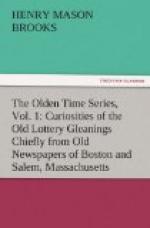Now hear the conclusion. I was passing through the same place on the 14th of March following, and was informed that eleven of the twelve matches had been solemnized, and that the young gentlemen of eight couples of the eleven had declared that their diffidence was so great that they certainly should not have addressed their respective wives, if the above scheme had not been introduced.——> Gentlemen under 20 and ladies under 15 were excluded as unmarriageable.
You will be pleased to let the
public hear of this scheme,
and I hope it will be productive of much good,
by being
practised in Virginia.
A Married Man without Children.
The weak spot in this plan, we imagine, would be the difficulty in keeping the blanks entirely secret.
* * * * *
We have not undertaken to give an account of all the lotteries of which we have seen advertisements, as our limits would not admit of it, even if it could be made interesting to those who like to read about such matters; New England alone would fill a large volume. We will name only a few of the more prominent lotteries,—the Land Bank, in 1759; the Pavement on Boston Neck, the same year. Then there was the Charlestown lottery, the Hatfield Bridge, Sudbury, the Amoskeag Canal, the South Hadley Canal, the Philanthropic, the Kennebec, the Dartmouth College, the Gloucester Road, the Plymouth Beach, etc. All these, of course, were public lotteries, and were managed by the first men in the community. In relation to private lotteries it would now be difficult to ascertain the facts. There must have been a great number of these; probably they were not always honestly conducted. We have heard that there were shops where the inexperienced were supplied with bogus tickets,—blanks of some drawn lottery. Bad men, unfortunately, are to be found in all kinds of business; but we know that in Salem all the men whose names we have mentioned were among the very best in the community.
Although laws are now in force in Massachusetts and some other States against lotteries, there appears to be no essential difference, as far as the morality of the thing is concerned, between the old lottery and the modern raffle,—and indeed a certain species of stock gambling, it seems to us, is worse than either in its moral effects. After the year 1826, or thereabout, lotteries appear to have become unpopular, and laws were passed prohibiting them. Their unprofitableness, moreover, seems then to have been more clearly seen. As we have already said, there had always been some who saw the evils which must result from such schemes. Notably among prominent men who in Massachusetts used their influence




